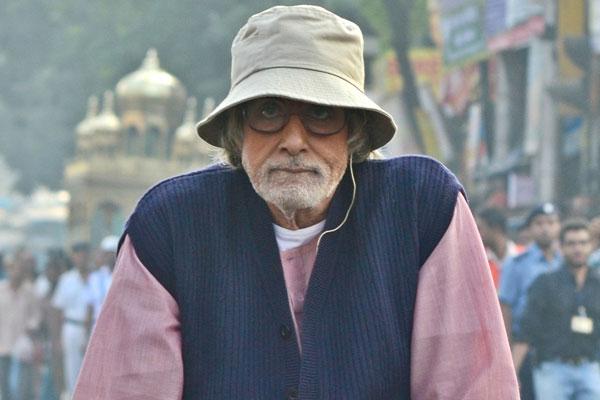 Images by Avishek Mitra/IBNS
Images by Avishek Mitra/IBNS
Big B: The Man Behind the Make-up
While Amitabh Bachchan shoots in Kolkata sporting a paunch with Deepika Padukone for Piku, TWF correspondent Shoma A Chatterji in an interview tries to discover the man behind the make-up
The great Amitabh Bachchan is shooting in Kolkata, where he once stayed and worked before his career in films, merrily cycling around the northern parts of the city with his artificial paunch while security men and production team have a trying time keeping crowds at bay. He has come to shoot for Piku, produced and directed by Shoojit Sircar. It is the story of a father-daughter relationship where Deepika Padukone plays the daughter. In a word-association-response game, the actor brings out the man behind the make-up – assuming he would not care for the word ‘mask’ - donned for forty years in hundreds of films. He indulges in some rare straight talk about family, faith, life and other things.
What did you really want to be before you became an actor?
I never ever thought of becoming an actor. My earliest dreams were targeted either at the army or appearing for the IAS. I began to work directly after college just to start earning. I worked in shipping for some time and then in advertising in Calcutta. Another dream I cherish was to become a journalist. I look upon journalism as a very creating and challenging vocation. One is addressing millions of readers through a single report. The journalist’s point of view would become the point of view of his millions of readers. The journalist I feel is a very important person.
Considering that you have been and still are, a subject of hero-worship, how do you look at this concept?
Hero worship is a phase in which a person begins to get admired as an actor not for himself but for his deeds in films he acts in and for his acting. The star or actor becomes a hero for his fans. It is a tremendous burden to live up to this responsibility. If he cannot, he comes crashing down. Public adulation is fickle. It can take you up and it can bring you down. When masses patronize a particular idiom such as an actor’s deeds on film, one tends to give the masses the same thing again and again. This is true of any mass-targeted entertainment in a democratic society.
Privacy of public personalities has dogged you from the time you became a star. What is your take on privacy?
Public figures and privacy cannot really go together though views and attitudes differ. In films, an actor or actress starts off by wanting to be recognized. Once recognition comes, he/she wants to shun the so-called hazards that come along with it. Every public figure has to learn to live with this hazard and one has to develop an individualistic attitude. Everyone loves his privacy. An actor should be individually responsible for how much privacy he wants and how much he is willing to surrender. Media wishes to provide people with stories of private lives of public figures. In a democratic society, this will sustain because we have freedom of expression and freedom of movement. Privacy can be guarded only if things like behaviour, attitude and occupation of the person are considered and then steps are taken to draw the line somewhere.
Do you believe that destiny plays a significant role in a person’s life, as it has sometimes played in yours?
I do not have any definite definition for the word ‘destiny.’ But I do have a certain faith in the unknown that tends to prevail over mankind, over humanity, over the universe. Many things happen that cannot be explained by reason or logic and that is what people call ‘destiny.’ Having said that, I would add that if everything were to be left to destiny then the world would come to a standstill. I believe that one must do one’s job honestly to the best of one’s ability and leave the rest to unknown forces. With strong will and powerful determination, one might sometimes be able to shape one’s own destiny.
You introduced the phenomenon of the “angry young man” to Indian cinema where we had a negative hero who expressed his protest through violent action as personal retribution. What is your take on this hero versus villain image?
The hero and the villain in Hindi cinema are depictions of the Good and the Evil. In films, we never show that Evil has overcome Good. You cannot take an incident in a film and relate it to real-life. Cinema is an area of make-believe. The Censor Board is told to take care but who is there to dictate the balance? Nothing can be treated in isolation. Who is to say which yardstick is right or wrong? You have to go back to history, education, social growth, religion, war, climate, language and discover the dynamics of the hero versus villain paradigm. The ethos in India perpetuated by Ramayana and Mahabharat – eliminate the violence and then talk. Eliminate Ravana from Ramayan and the Kurukshetra war from Mahabharat and then talk. Give me one example of a man who just got up and started beating up the next man.
What role does the audience play in an actor’s career?
No actor can exist without audience acceptance because cinema feeds on audience acceptance and recognition. If a poet did not have an audience he would cease to exist and so would the politician. The audience is an important source of collective power because it can collectively create you and destroy you. It is the media that bestows an actor with an image. This image is formed in the minds of the masses and the audience is responsible for this. For any actor, acting is more reacting than acting. It is a re-enactment of voices, characters you have seen in life. Acting is pretending to be someone else. I do not think it helps if an actor tries to ‘become’ the character he is playing. Nor is it possible every time.
What is your take on family, love, children and parents?
If you have created a family, you must own up to the responsibility of looking after it. It is a great binding force. It is a phenomenon that gives moral strength both inwardly and outwardly and those who believe in it should strive to maintain it. To me, love means not so much looking at one another as it is looking in the same direction. Love is a more important and essential emotion than hate. If love alone were to prevail, the world would have been a much happier place than it now is. Children are the product of the union of two people and therefore, the most beautiful and wonderful act of mankind’s creation. They are the most lovable things and should be treated accordingly. We would not be around but for our parents. Our hates, jealousies, love, success, failure, everything comes from them.
Images of Amitabh Bachchan shooting in Kolkata: By Avishek Mitra
Top Headlines
-
Entertainment
Bollywood 2025: Hits, Hype and Heartbreaks as Dhurandhar Redefines the Year
December 24, 2025
-
Entertainment
Rotary Club of Calcutta East Central celebrates centenary of iconic actor Santosh Dutta with statue unveiling
December 04, 2025
-
Entertainment
Valentyn Vasyanovychs To The Victory! wins 2025 TIFF Platform Award unanimously
September 26, 2025
-
Entertainment
Chlo Zhaos Hamnet Wins TIFF 2025 Peoples Choice Award
September 20, 2025
-
Entertainment
Sholay: Golden even after fifty years
July 04, 2025
-
Entertainment
War 2: Check out Hrithik Roshan, Jr NTR and Kiara Advani's new posters
June 26, 2025
-
Entertainment
LGBTQIA+: Icelandic film Odd Fish and Brazil's Baby win big at KASHISH 2025 film festival
June 12, 2025
-
Entertainment
Katrina Kaif named Maldives tourism global brand ambassador ahead of Modi's visit
June 10, 2025
-
Entertainment
'Queen marches to conquer': Deepika Padukone joins Atlee's AA22xA6 starring Allu Arjun after 'Spirit' exit
June 08, 2025
-
Entertainment
Dakota Johnson and Chris Martin, who were in on-and-off relationship, broke up: Reports
June 06, 2025


